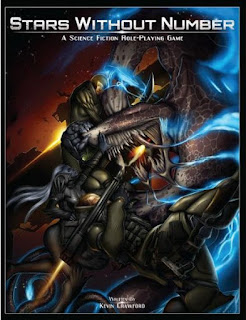Prompt: Forthcoming game you are most looking forward to
The simple answer to this one is the World of Darkness 2nd edition releases in general, and Awakening in particular, because although I will probably never play them it is fascinating to me to see how they address issues which the IoD discovered in play, and how they change the mechanics of the game to clarify the setting.
 |
I don't care how clearly it's a rhomboid jellyfish,
I'm sticking with pyrasquid. |
I also find it interesting that they were not originally touted as second editions, but as the [Antagonist] Chronicles. The initial pitch was that these were almost subsets of the main game, assuming certain metapoints in a way that
The World of Darkness assiduously didn't. It was clear from
The God Machine Chronicle/The World of Darkness Second Edition onwards that the mechanics were being drastically overhauled; not in a way that entirely worked for LARP, but then it wasn't supposed to, and the prospects for TT were good.
Awakening especially impresses me because it seems to be making tangible strides towards a game engine that specifically models the
purpose of the game. Routine magical defence no longer inhibits your ability to do other things, because the game is about exploring mysteries, and you can't do that if you're scared all the time. While secrets need work to uncover, you no longer need a significant effort to just see the weirdness around you, because the game is about seeing the weirdness. Routine stuff is no longer allowed to get in the way of the point of the game, is what I'm saying. It's a move away from simulationism - not that WoD was ever hardcore simulationist - towards a more narrative focus. It's there in the very core concept of the new game: You are a mage, and mages investigate mysteries, they don't pussyfoot around wondering if they dare drop their sights or their armour, and the best way to encourage players to just get in there is to make it so that they don't have to.
I strongly suspect that Awakening 2nd edition would be completely impractical for live play, but then I don't play live age anymore.
-
New editions are always a thing in gaming; a chance to do something new with an existing property; a chance to correct mistakes, iron out the wrinkles and get rid of that one thing that makes you cringe each time you read it. The original WoD games were pretty rough and ready, and Vampire and Werewolf were being revised even before half the games were in first edition.
What should a 2nd (or later) edition do?
1) Develop substantially on the previous edition.
Seriously; there's no point in producing a new core book for small changes; well, no point except grafting and gamers are hard to squeeze; not because they're canny, but because so many of them are skint. Now that a book comes in at £30-£50 print and £15-£30 PDF, we're careful with our money, so we're not just looking for substantial change, we want
development; for the new product to build on the other rather than just having change for change's sake. It should tighten what is loose, clarify what is vague and in all ways address existing concerns to make the game more playable.
2) No exploding metaplot.
White Wolf's new editions laboured under the weight of metaplot. Much of it was ignorable, but later Mage editions in particular were cumbersome with it, to the point of hamstringing a number of factions by incorporating elements which established that in the grand struggle to establish the nature of reality, there were PC splats that were
just plain wrong. It was also unstoppable; there was never anything the PCs could do about the metaplot.
Similarly, the new version of WFRP - not the boxed set; the one before that - revised the Old World setting into line with the current Warhammer Fantasy Battle background; more epic, more heroic*, less grubby. I liked the world grubby. Of course, then they blew the new version up and replaced it with the Age of Sigmar, which is pretty much WFB turned up to 40,000. I doubt that an Age of Sigmar RPG could go much more than a few sessions, although it might be fun while it lasted.
3) Continuity of concept.
Again, coming back to Mage the Ascension, the final edition made traumatic changes to the nature of the underlying ontology that kind of rendered all previous material moot by establishing an
objective reality.
4) Lack of repetition.
A big part of the continuity thing is that the new edition should build on, rather than replacing the old. Back compatibility to keep your old books as a worthwhile investment and a live resource does wonders.
So, in summary, a new edition should build on the old, not knock it down and start again or mutate it out of all recognisable shape. It should improve, and should be playable with the older material with no or minimal hacking required. I'm pretty sure that Awakening 2nd
doesn't do all these things, being a massive do-over, but c'est la vie. I've never been fond of ideals, I guess.
Look for the hashtag #rpgaday for more RPG a Day thoughts.
* Although saying that, it did massively reduce the number of magical items floating around the world.






